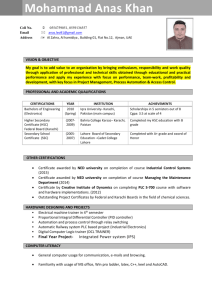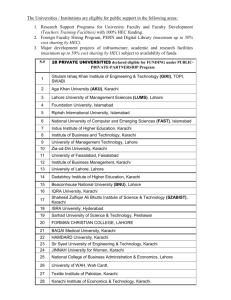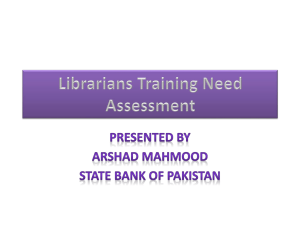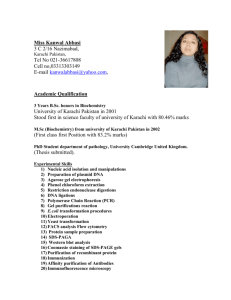document
advertisement
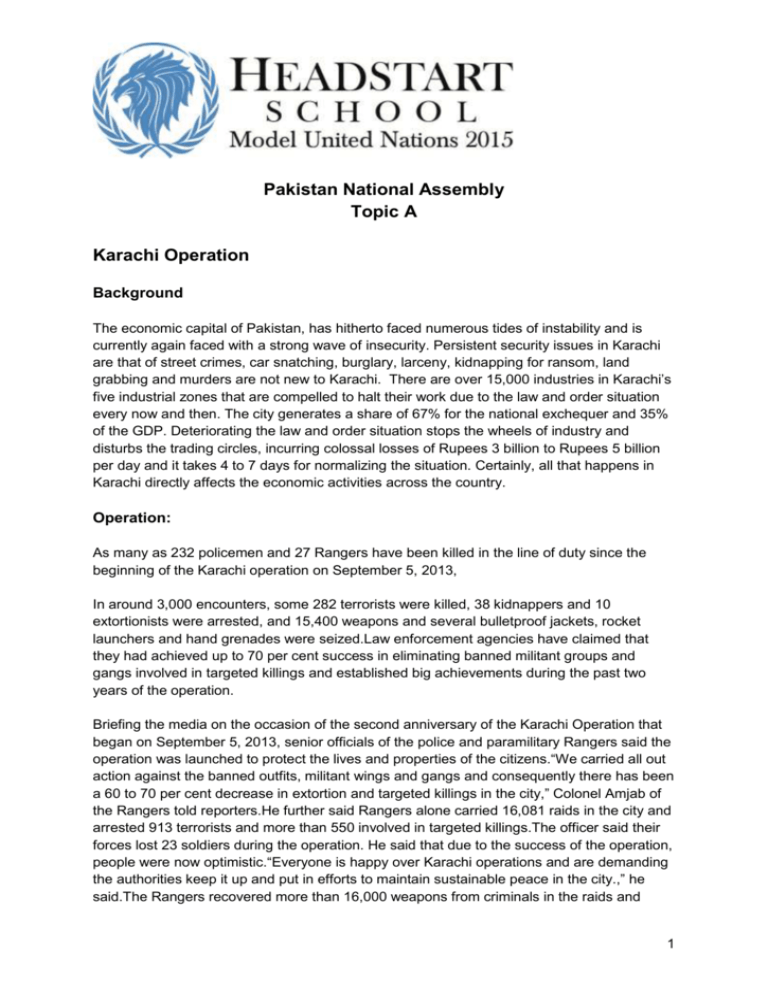
Pakistan National Assembly Topic A Karachi Operation Background The economic capital of Pakistan, has hitherto faced numerous tides of instability and is currently again faced with a strong wave of insecurity. Persistent security issues in Karachi are that of street crimes, car snatching, burglary, larceny, kidnapping for ransom, land grabbing and murders are not new to Karachi. There are over 15,000 industries in Karachi’s five industrial zones that are compelled to halt their work due to the law and order situation every now and then. The city generates a share of 67% for the national exchequer and 35% of the GDP. Deteriorating the law and order situation stops the wheels of industry and disturbs the trading circles, incurring colossal losses of Rupees 3 billion to Rupees 5 billion per day and it takes 4 to 7 days for normalizing the situation. Certainly, all that happens in Karachi directly affects the economic activities across the country. Operation: As many as 232 policemen and 27 Rangers have been killed in the line of duty since the beginning of the Karachi operation on September 5, 2013, In around 3,000 encounters, some 282 terrorists were killed, 38 kidnappers and 10 extortionists were arrested, and 15,400 weapons and several bulletproof jackets, rocket launchers and hand grenades were seized.Law enforcement agencies have claimed that they had achieved up to 70 per cent success in eliminating banned militant groups and gangs involved in targeted killings and established big achievements during the past two years of the operation. Briefing the media on the occasion of the second anniversary of the Karachi Operation that began on September 5, 2013, senior officials of the police and paramilitary Rangers said the operation was launched to protect the lives and properties of the citizens.“We carried all out action against the banned outfits, militant wings and gangs and consequently there has been a 60 to 70 per cent decrease in extortion and targeted killings in the city,” Colonel Amjab of the Rangers told reporters.He further said Rangers alone carried 16,081 raids in the city and arrested 913 terrorists and more than 550 involved in targeted killings.The officer said their forces lost 23 soldiers during the operation. He said that due to the success of the operation, people were now optimistic.“Everyone is happy over Karachi operations and are demanding the authorities keep it up and put in efforts to maintain sustainable peace in the city.,” he said.The Rangers recovered more than 16,000 weapons from criminals in the raids and 1 crackdowns.The Rangers and the police worked together in the ongoing operation, with authorities saying cooperation would continue in the future as well. Karachi police chief, Mushtaq Mahar said before the launch of the operation every day eight people were shot dead by the outlaws but now this rate had significantly come down because of the rigorous efforts of the police. He, however, confessed that terrorists’ sleepercells were operating in the city, but vowed the police would eradicate those cells as well. Highlighting the performance of the police force, Mahar said in the past two years there were some 3,500 armed encounters with criminals and militants. In those encounters and due to targeted killings more than 250 police officers and officials were martyred, he said.In thousands of raids carried out by police during the period under review, they seized explosives of more than 500kg besides recovering 17 suicide vests. More than 15,000 weapons were also recovered from the criminals during the raids, he said. The police arrested 343 extortionists and in the process of self-accountability, more than 1,000 police officials were also blacklisted for their involvement in crimes. The police chief said controlling street crime was still a big challenge for the police and special cells were being set up to overcome cellphone snatching and other petty street crimes. The police has recommended the government to set up more speedy courts to prosecute the arrested killers and highprofile criminals. A list of heinous crime cases was also being drawn to be referred to the military courts, which were set up to dispense cases instantly. Political Parties: While the leadership of Pakistan People’s Party (PPP) claims it is being targeted by the law enforcement agencies and armed forces in Karachi Operation, the military says that PPP is the third political outfit of the country to cry “victimisation” after the launch of Operation Zarbe-Azb. With the operation against terrorists and criminal gangs in full swing across country, questions have been raised by major political forces of Sindh – PPP and Muttahida Qaumi Movement (MQM). However, Jamiat Ulema-e-Islam-Fazl (JUI-F) chief Fazlur Rehman was the first one to cry foul for including the term “religious terrorists” in 20-point National Action Plan (NAP) last year, pushing the Pakistan Muslim League-Nawaz (PML-N) government for ending reforms in religious seminaries. Not only the JUI-F chief had resisted the action against terrorists but he had also gathered the leaders of all religio-political parties and Wafaq-ul-Madaris to preempt madrassa reforms. Consequently, the prime minister had to fall in line with the interior minister announcing that the government had no plans to reform the madrassas. Later on, when the Karachi Operation gathered momentum, MQM – which had earlier called on the army chief to enforce a martial law and launch an operation to purge the city of terrorists – dubbed the operation to be “Mohajir-specific”. 2 Recently, PPP ended up as third in the lot with former president and PPP Co-chairman Asif Zardari pointing a finger at the military for “victimising” his party during the operation. Zardari’s speech had caused ripples across the country when he severely criticised the generals. He had said that he knew how many cases were in the courts and how many generals are accomplices. He had warned: “don’t target us or we’ll turn everything upside down; stop throwing dirt at us; this is our army, our institution; you stay in office for three years and then go back home; I, not Musharraf, know the threats being faced by the motherland; I remained in jail for five years under him but the ‘commando’ was not ready for three months’ imprisonment; everything will come to a halt from Khyber to Karachi the day I stand up; only those who shouldered the coffins of their loved ones know the worth of democracy.”Following Asif Zardaris tirade, PPP’s Secretary Information Qamar Zaman Kaira tried to play cool towards the army, rather lashing out at the federal government for giving Zardari’s speech an anti-army colour. He also reminded the ruling party that unlike PML-N, PPP had “always sided with the military”. “It’s their (PML-N) leaders who targeted the army leadership, sacked army chiefs and also made hostile speeches in the parliament. Unlike PML-N, PPP has always stood by the Army. There is a need to fully understand the context of the former president’s speech,” Kaira asserted while addressing a press conference on Thursday. Kaira blamed the political leaders for misconstruing Zardari’s statement “to make it more anti-establishment”. “PPP has always strengthened the national institution. Even when Bhutto was hanged, we blamed Ziaul Haq and his accomplices. We never blamed the institution,” he said. Claiming that the former president had always lauded the army’s role in eliminating terrorism, Kaira said, “We have already said we don’t want any hurdles in the military operation. Why then would you think we would say something that is considered anti-establishment?” On the other hand, the military leadership looks determined to take the Karachi Operation to its logical conclusion regardless of claims of victimisation and selective approach from some ethno-political parties. A senior security official told Pakistan Today that there was no victimisation whatsoever of any political party, ethnic or religious group and the Rangers had been called in by the federal government with a clear task to purge the port city of Karachi from criminal gangs, their facilitators, financiers and facilitators. “Only criminal gangs, mafia groups and terrorist organizations are being targeted in Karachi. In first phase, the hardcore criminals and terrorists were taken out. Now second phase of operation is focused on smashing their networks. Law enforcers are rounding up abettors, facilitators and financiers of the criminals and mafia gangs,” the official said. “Soldiers are apolitical. The army chief has given clear instructions that this operation is apolitical and it would remain so. Moreover, we will make sure it should be across the board and it should also look like so,” the official added. Asked what had prompted the PPP leadership to cry foul, the military official said he had no clue about it. “In past few days, we have netted some big fish which might have prompted reaction from the abettors of the criminals. The raid on Karachi 3 Building Control Authority and arrest of Muhammad Ali Shaikh were important developments. The arrested suspects have provided important leads,” the official said, adding that more arrests were on cards. “Since the operation began, Rangers have rounded up criminals linked to religious and terrorist outfits, political parties and gang war. However, only politicians have cried foul just to hide behind allegations. We have also arrested terrorists of TTP, Sunni Tehreek and other groups,” the official added, questioning as to why only PPP and MQM were complaining. Muttahida Qaumi Movment (MQM) leader Farooq Sattar has said that his party was being politically victimized and pushed against the wall. Putting forward his party’s stance on the Karachi operation in the National Assembly, Sattar said a conspiracy has been hatched against the MQM and the party’s arrested workers were not being presented in court. Sattar told the National Assembly that over 40 workers of the party had been killed extra-judicially. According to the MQM leader, houses of party workers were being raided in Karachi. Sattar further said that a ban has been enforced on social and charitable activities of the party while television channels have been instructed against live broadcast of MQM chief Altaf Hussain’s speeches. “MQM is being pushed against the wall and the path is being cleared for another in the local bodies elections,” Sattar said. He also stated that the Pakistan Tehreek-e-Insaf (PTI) was being helped in Karachi. Following the assembly session, lawmakers from the MQM submitted their resignations to National Assembly Speaker Ayaz Sadiq. Farooq Sattar spoke with reporters after the resignations were accepted and said MQM had resigned from the NA, Senate and Sindh Assembly. The MQM leader emphasised that the decision to resign was a political one and in protest. “The Karachi operation is not against criminals and terrorists,” Sattar said. The MQM leader alleged that the objective of security forces in Karachi was not to prove cases against accused in court but rather to keep them detained indefinitely. Sattar claimed that the MQM’s demand for the formation of a judicial commission to probe extra-judicial killings had fallen on deaf ears. Prime Minister Nawaz Sharif has decided to constitute a committee to oversee the crackdown on criminal elements in Karachi and also formed a body to listen to the grievances of Muttahida Qaumi Movement (MQM). “All the legitimate reservations of MQM will be addressed,” stressed PM Nawaz Sharif during his meeting with a deletion of MQM which called on him here today. During the meeting MQM expressed its reservations in connection with the ongoing operation against criminals in Karachi. The delegation reiterated its complaint that the operation in Karachi was only targeting MQM. Prime Minister Nawaz Sharif said the operation was not against any political party rather it is targeting only the criminals and it will continue till all the anti-social elements are crushed. “Restoration of peace in Karachi and ensuring safety of its citizens are the foremost priorities of the government,” he said. He said an impartial operation in Karachi is in the interest of all the stakeholders including MQM. 4 Questions to answer 1. Was it correct to hand over the operation to the army rangers? 2. Are people given access to justice and due process during and after the raids? 3. Has the army over stayed its welcome, is there now a question of why its presence in Karachi continues to strengthen? 4. What role have political parties played in contributing towards the spread of terror in the city? 5. What responsibilities should the oversight committee have in order to ensure all stakeholders are represented and their grievances heard? 6. Is there a foreign hand in the instability in Karachi? 7. How successful has the PPP been in curbing terrorism and bringing stability to Karachi? 8. Are the police and rangers indulging in extra judicial killings under the pretext of eliminating terrorists? 9. Is there significant improvement in Karachi’s security situation? 5 Pakistan National Assembly Topic B Kasur Child Molestation Case Abuse: Sexual abuse, also referred to as molestation, is forcing undesired sexual behavior by one person upon another. When that force is immediate, of short duration, or infrequent, it is called sexual assault. Child sexual abuse is a form of child abuse in which a child is abused for the sexual gratification of an adult or older adolescent.[10][11] It includes direct sexual contact, the adult or otherwise older person engaging indecent exposure (of the genitals, female nipples, etc.) to a child with intent to gratify their own sexual desires or to intimidate or groom the child, asking or pressuring a child to engage in sexual activities, displaying pornography to a child, or using a child to produce child pornography. Scandal: The Kasur child sexual abuse scandal is a series of child sexual abuses that occurred in Hussain Khanwala village in Kasur District, Punjab,Pakistan from 2006 to 2014, culminating in a major political scandal in 2015. Details of the child sex abuse scandal were reported by local media, with some reports saying that 280 children were molested by a gang, which also made around 400 videos of children, later using them to blackmail families and receiving money from them. In one instance, the father of one of the victims had to pay PKR 1.2 million to save the honor of his child. Most of the victims in the video were under the age of 14. The scandal caused nationwide outrage, among allegations that the Punjab police and Malik Ahmed Saeed, Kasur's Member of the Provincial Assembly from the ruling Pakistan Muslim League (Nawaz), were involved in an attempted cover-up of the abuse. Investigation: A high-level inquiry committee was formed by the Punjab government to investigate allegations of authorities' inaction to check instances of child sex abuse and blackmailing by a gang in Husain Khanwala and other villages in Kasur district concluded that reports of child molestation are baseless. Sanaullah said almost eight years ago, incidents of child molestation and videos of such acts to blackmail families had been reported in the area, adding that cases were registered against those involved and the culprits were apprehended. The provincial minister and PML-N stalwart insisted that the scandal had been created by rival parties who were involved in a fierce land dispute. 6 The inquiry, sanctioned by Punjab Chief Minister Shahbaz Sharif, was conducted by Additional Inspector General Arif Nawaz Khan and Commissioner Lahore Division Abdullah Sunbal. Trial: A petition has been filed at the Anti Terrorism Court of Lahore, seeking trial of the child abuse case in military court.The court admitted the petition, filed by Aftab Bajwa, and sought answer from the government whether the case could be taken to a military court.The petition also urged the court to summon police officer concerned and question them about their action when the child abuse case had been reported. Meanwhile, the Punjab Government has written a letter to the Lahore High Court for formation of judicial commission to probe the Kasur child abuse scandal.The six suspects of the case have been presented to the court and a verdict regarding their plea for bail will be announced shortly. Victims: One survivor said that he paid at least Rs 10 lakh as extortion over the period of 3 years, adding that they used to own a general store but now works on a daily wage. Another survivor told that the molesters threatened to kill him if he told anyone about the abuse. One of the other victims was threatened for trying to go to the police. Questions to be answered: 1. How is it that this crime has remained hidden for many years? 2. How seriously has this scandal been taken? 3. How legit are the inquiries or attempts of investigation if an influential person is involved in the act of crime? 4. Amid the involvement of the influential persons, would justice be carried out? 5. What consequences will the victims suffer from? 6. What rehabilitation measures can be taken to assist the victims of the kasur incident? 7. How will the families of the victims be assisted? 8. How will the criminals be punished? 9. How will the members of the national assembly make sure that the prevalence of such cases is reduced? 7
